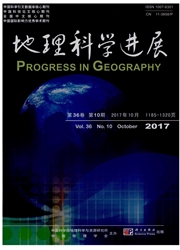

 中文摘要:
中文摘要:
基于国内外脆弱性研究文献资料的回顾,对脆弱性研究的演进过程、研究现状与进展、面临的挑战进行了梳理与分析,指出了脆弱性研究对于推动地理学人地系统研究的借鉴意义。作为当前全球环境变化及可持续性科学领域的一种新的研究视角,脆弱性研究得到了地理学以及相关学科的广泛关注,呈现出跨学科、综合集成的研究趋势,在概念体系、分析框架、评价方法等方面研究进展丰富,但尚未在学科交叉融合的基础上形成独立完善的理论与方法论体系。随着脆弱性研究越来越关注人文与自然要素综合作用下的耦合系统脆弱性过程与机制,脆弱性研究在分析人地相互作用的尺度嵌套问题、促进人地系统研究的综合集成与学科交融、增强人地系统研究的实践指导方面具有重要的应用价值。
 英文摘要:
英文摘要:
Based on the analysis of existing literatures on the theme of vulnerability,this paper reviews the evo-lution and progress of vulnerability research,and analyzes the challenges facing present vulnerability research and the scientific implications of vulnerability approach in coupled human-environment system research.As a new research perspective in the arena of global environmental change and sustainability science,vulnerability approach has attracted extensive attention from scholars in geography and related disciplines,and is moving to-ward inter-disciplinary and comprehensive studies.Great progresses has been made in vulnerability conception,analytical frameworks,assessment methods and so on,but there is still lack of consummate vulnerability theoret-ical system and methodology on the basis of merging and crossing of different disciplines.With more and more attentions being paid to the vulnerability of coupled human-environment system under the interactions between human and natural factors,vulnerability approach has significant application value in analyzing the nested scale of human-environment interactions,promoting the integration study of key factors and processes,advancing the merging and crossing of related disciplines,and enhancing the decision support capacity of coupled human-envi-ronment system studies.
 同期刊论文项目
同期刊论文项目
 同项目期刊论文
同项目期刊论文
 Economic Transformation Capacities and Developmental Countermeasures of Coal-resource-based Counties
Economic Transformation Capacities and Developmental Countermeasures of Coal-resource-based Counties Vulnerability of Large City and Its Implication in Urban Planning: A Perspective of Intra-urban Stru
Vulnerability of Large City and Its Implication in Urban Planning: A Perspective of Intra-urban Stru 期刊信息
期刊信息
